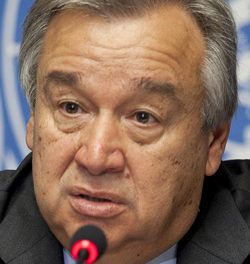
COVID-19 is reversing decades of progress on poverty, healthcare and education – UN report

New York – The 15-year global effort to improve the lives of people everywhere through the achievement of the 17 Sustainable Development Goals (SDGs) by 2030 was already off track by the end of 2019.
And now, in only a short period of time, the COVID-19 pandemic has unleashed an unprecedented crisis, causing further disruption to SDG progress, with the world’s poorest and most vulnerable affected the most, according to a new report released today by the UN Department of Economic and Social Affairs.
According to the Sustainable Development Goals Report 2020, the world had been making progress although uneven and insufficient to meet the Goals, in areas such as improving maternal and child health, expanding access to electricity and increasing women’s representation in government. Yet even these advances were offset elsewhere by growing food insecurity, deterioration of the natural environment, and persistent and pervasive inequalities.
Now, the COVID-19 pandemic has quickly become the worst human and economic crisis of our lifetime, spreading to all countries, with the global death toll exceeding 500,000 and the number of confirmed cases at more than 10 million people.
“As Member States recognized at the SDG Summit held last September, global efforts to date have been insufficient to deliver the change we need, jeopardizing the Agenda’s promise to current and future generations,” said UN Secretary-General António Guterres.
“Now, due to COVID-19, an unprecedented health, economic and social crisis is threatening lives and livelihoods, making the achievement of Goals even more challenging.”
The Secretary-General stressed that COVID-19 was not affecting everyone the same. “Although the novel coronavirus affects every person and community, it does not do so equally. Instead, it has exposed and exacerbated existing inequalities and injustices.”
Using the latest data and estimates, this annual stocktaking report on progress across the 17 Goals shows that it is the poorest and most vulnerable including children, older persons, persons with disabilities, migrants and refugees who are being hit the hardest by the effects of the COVID-19 pandemic. Women are also bearing the heaviest brunt of the pandemic’s effects.
The report also shows that climate change is still occurring much faster than anticipated. The year 2019 was the second warmest on record and the end of the warmest decade of 2010 to 2019.
Meanwhile, ocean acidification is accelerating; land degradation continues; massive numbers of species are at risk of extinction; and unsustainable consumption and production patterns remain pervasive.
The annual report, a joint effort of the global statistical community, is being launched on the opening day of the UN High-level Political Forum on Sustainable Development as leaders from governments and different sectors of society gather to chart strategies and efforts to fully implement the SDGs.
The report provides essential data that allows decision-makers to guide efforts toward a sustainable recovery.
“The principles on which the SDGs were established are key to building back better in the post-COVID-19 recovery,” said UN Under-Secretary-General for Economic and Social Affairs, Liu Zhenmin.
“The continued pursuit of these universal Goals will keep Governments focused on growth, but also on inclusion, equity and sustainability. Our collective response to the pandemic can serve as a ‘warm-up’ for our preparedness in preventing an even larger crisis – that is, global climate change, whose effects are already becoming all too familiar.”
To download the full report, please visit: https://unstats.un.org/sdgs













































